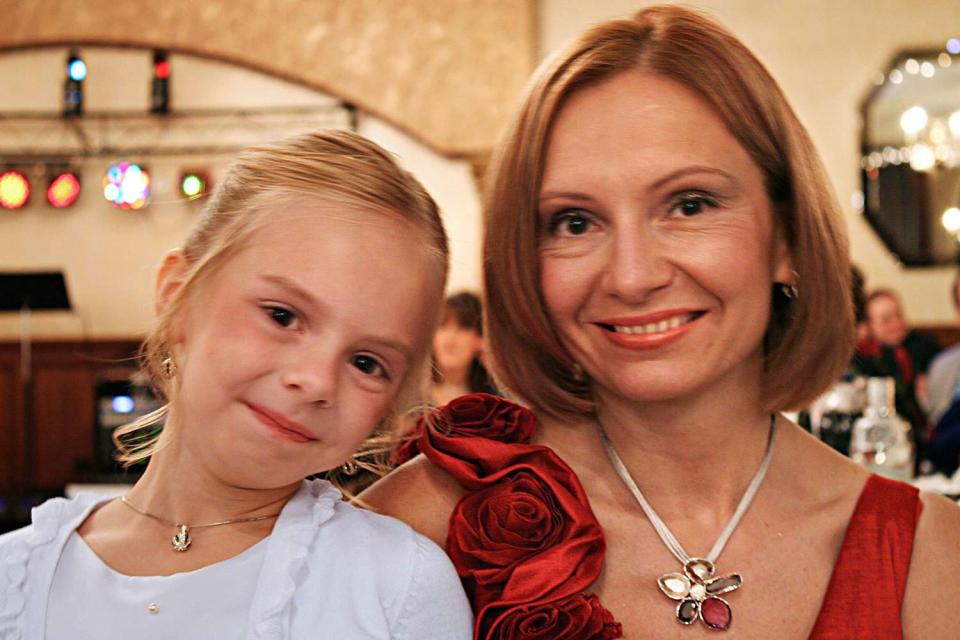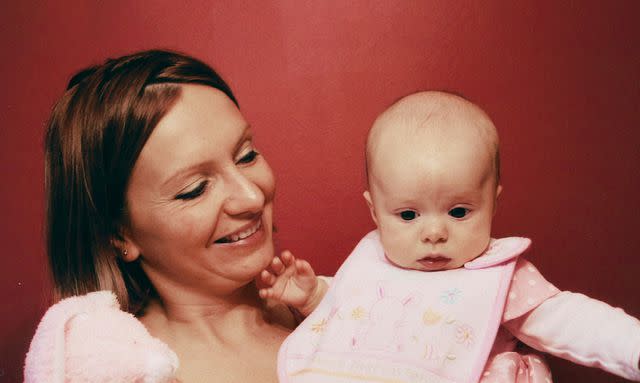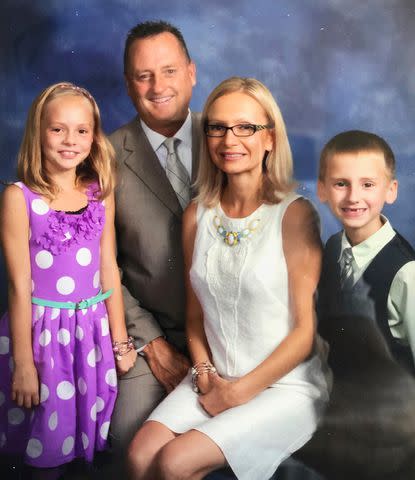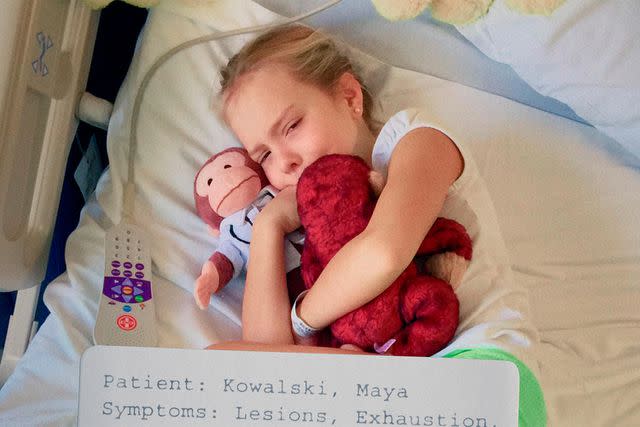Daughter Tearfully Recounts Last Time She Saw Mom Alive Before Her Suicide Amid Child Abuse Accusations
- Oops!Something went wrong.Please try again later.
Maya Kowalski, whose ordeal was featured in Netflix's "Take Care of Maya," testified about her last moments with her mother

Jack Kowalski
Maya and Beata KowalskiIn October 2016, Maya Kowalski’s mother came to visit her in the hospital in St. Petersburg, Fla., when the then-10-year-old girl was suffering from a rare neurological condition that left her in debilitating pain.
“I remember my mom had to leave at a certain point and it was the last time I talked to her,” Maya, now 17, recounted on the stand Monday in Sarasota Circuit Court in Sarasota, Fla. “She said ‘I love you and I’ll see you tomorrow.’”
Breaking down into tears, Maya said, “I never saw her again.”
Maya never saw her mother, Beata Kowalski, again after staff members at the Johns Hopkins All Children’s Hospital in St. Petersburg, Fla. notified child protective services that Beata was insisting that Maya's chronic pain be treated with ketamine -- and a judge ordered her to be held at the hospital.
Hospital officials said they believed Beata was making her daughter sick on purpose and then insisting on an aggressive treatment because she had Munchausen syndrome by proxy, a mental disorder in which a caregiver fakes or causes symptoms to make a child appear to be sick.
As a result, a judge ordered Maya to be held in state protective custody – away from her mother for 87 days while the allegations were investigated.

Jack Kowalski/Netflix
Distraught over the accusations that she was abusing her daughter — and not being able to see her daughter — on Jan. 7, 2017, Beata died by suicide.
Related: Maya Kowalski Testifies During 'Take Care of Maya' Trial About Hospital Staff: 'I Was Crying'
In court, Maya testified that she woke up around 2 a.m. the following morning, not yet aware of her mother's death. “I was crying ‘I miss my mom, I love my mom,'” Maya recounted.
She was shocked when she later learned that her mom died around that time. “I had this feeling," she testified. "I felt it.’”
Maya’s family is suing the Johns Hopkins All Children’s Hospital for $220 million for allegedly accusing her mother of Munchausen by proxy, which they say led to her suicide.
Want to keep up with the latest crime coverage? Sign up for PEOPLE's free True Crime newsletter for breaking crime news, ongoing trial coverage and details of intriguing unsolved cases.
Maya’s father, Jack Kowalski, filed the $220 million lawsuit in 2018 alleging that the hospital separated Beata from Maya, who was taken into state custody for three months in 2016 when she was 10.
Jack filed the lawsuit in 2018 on behalf of his children, Maya and Kyle, and the estate of his late wife, alleging medical malpractice, false imprisonment and intentional infliction of emotional distress.

Netflix
The ordeal was chronicled in the haunting Netflix documentary Take Care of Maya, produced by PEOPLE contributor Caitlin Keating, which was the subject of a PEOPLE cover story in June.
The family's ordeal began in 2015, when Maya was diagnosed with Complex Regional Pain Syndrome (CRPS), a rare neurological condition that causes excruciating pain in response to the slightest touch, PEOPLE reported previously. She was administered a ketamine treatment by a Tampa doctor who specializes in CRPS.
In 2016, Maya was checked into the Children's Hospital for debilitating stomach pain. Hospital staff reported Beata, a registered nurse, to DCF after she repeatedly requested Maya be treated with ketamine, saying the drug had been effective for Maya in the past.
During her testimony, Maya told the court, “She never gave me IV ketamine at home.”
Maya also recounted how her condition worsened in the hospital, especially when she alleged staff members and medical personnel didn’t believe how much she was suffering.
“My condition went downhill (in the hospital),” she testified.
“I told them my constantly about my pain," she testified. "They weren’t listening, so I stopped telling them. Only when they asked.”

Beata Kowalski
Maya said her pain is still so debilitating from the CRPS that “there are days I stay in bed for days on end” and that she currently has multiple lesions on her right leg.
When she left the hospital, she said she was scared to see another doctor again.
'Medically Kidnapped' in the Hospital
During her emotional testimony on Monday, Maya, who told PEOPLE in an exclusive June interview that she was "medically kidnapped," testified about the strict measures the staff took while she was in state custody.
They wouldn’t allow Maya to speak Polish to her mom on the phone. “I was told I had speak English so they could understand,” she testified.
Raised as Catholic, Maya said she wasn’t allowed to have sacraments that a priest brought her, including Holy Communion.
“They believed my mom was putting ketamine in the wafers and the holy water,” she testified.
Eventually she was given the rosary and prayer book, but didn’t let her pray with her mother on the phone, she testified.
“They thought my mom was controlling me through religion.”
She added: “They never directly told me what was going on. I was stripped from my family.”
One of the most emotional moments of the day’s testimony came when Maya recounted how she was given $20 to spend when she turned 11 in the hospital.
She bought her brother Kyle a Nerf gun, her dad his favorite mints and a necklace for her mom that said, "I love you to the moon and back."
She later learned that mother cherished the necklace — and was wearing it when she died by suicide.
“I’m wearing it right now,” Maya testified, breaking down into sobs.
Many jurors were crying when Maya mentioned the necklace, and people in the gallery were visibly upset.
Why the Hospital Was Concerned
According to the hospital's attorneys, the hospital was concerned about the high doses of ketamine Beata was asking staff members to give her daughter — many times the limit approved by the FDA, the Tampa Bay Times reported.
Over a nine-month period, according to the hospital's attorneys, Maya had allegedly received 55 doses of ketamine, which has been approved by the FDA to use mainly as anesthesia and a sedative but has been used “off-label,” also, according to the National Institutes of Health.
In Maya’s case, it was used to alleviate her pain.
Doctors at the hospital were hesitant to give her such a high dose of the drug – 1,500 milligrams — especially since she was on 21 other medications, Howard Hunter, the lead attorney for the hospital, said in court in September, the Tampa Bay Times reported.
“They had a child being given levels of medication they had never heard of before, that the literature did not support,” Hunter said in court, the Tampa Bay Times reported.
Hunter told the court that the hospital “acted out of reasonable caution” while figuring out how to treat Maya, the Tampa Bay Times reported.
On Wednesday, Ethen Shapiro, another attorneys for the hospital, pointed out that Maya had undergone a ketamine coma treatment in Mexico that carried a 50 percent risk of death, Fox 13 News reports.
Jack Kowalski, when asked on the stand if he was aware of the risk, responded by saying, “There is a risk in every procedure.”
Shapiro replied, "I understand that, Mr. Kowalski, but respectfully there’s a risk and then there’s a risk that’s a coin flip in which your daughter could pass. Did you know it was 50%?"
Jack Kowalski responded, "They stated it was 50%, but they stated no one every died from that procedure," Fox 13 reports.
If you or someone you know is considering suicide, please contact the 988 Suicide and Crisis Lifeline by dialing 988, text "STRENGTH" to the Crisis Text Line at 741741 or go to 988lifeline.org.
For more People news, make sure to sign up for our newsletter!
Read the original article on People.

